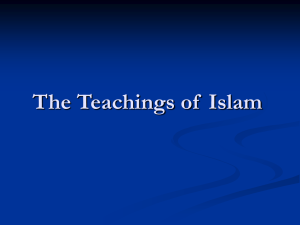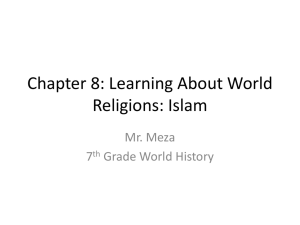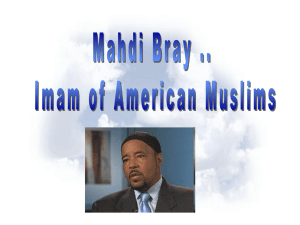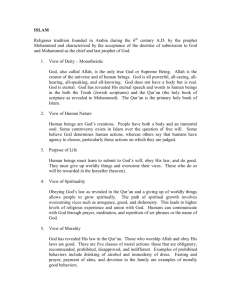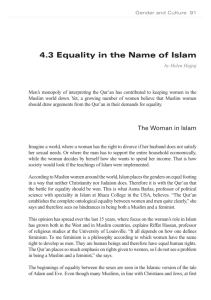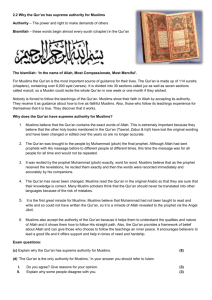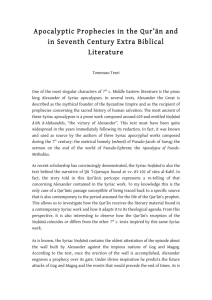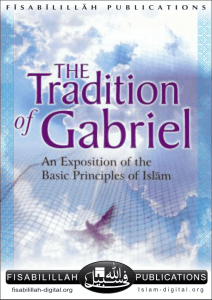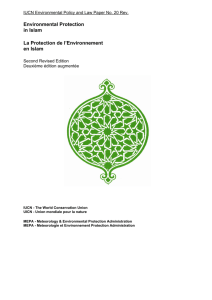Religious authorities in Islam Asma Barlas How do Muslims define
advertisement
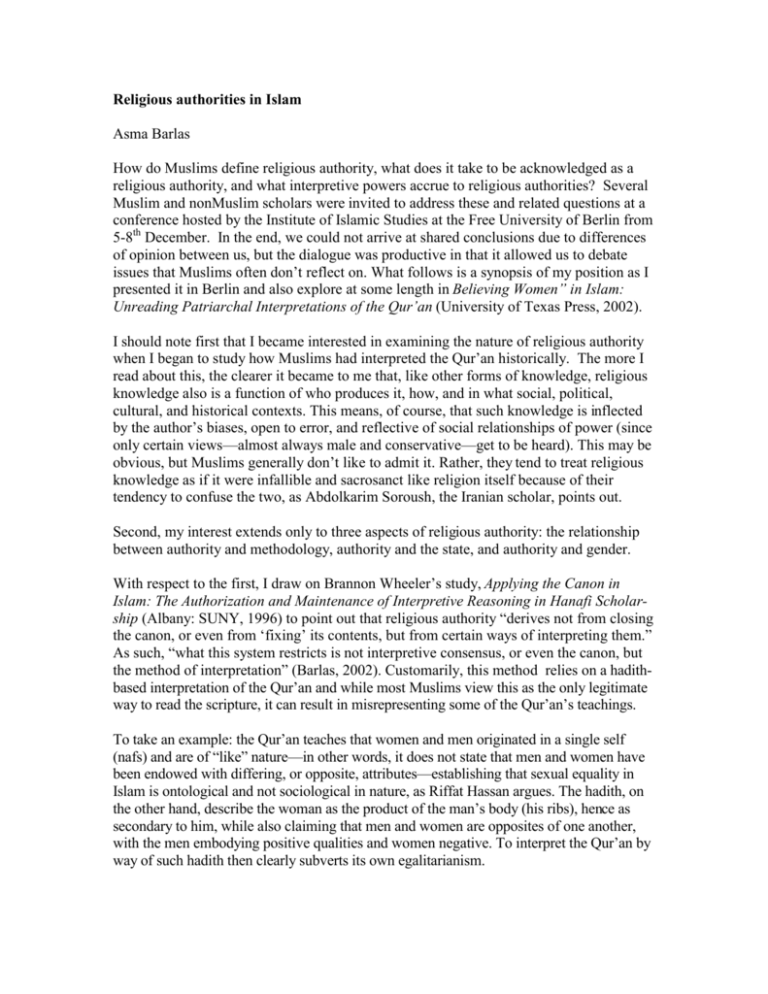
Religious authorities in Islam Asma Barlas How do Muslims define religious authority, what does it take to be acknowledged as a religious authority, and what interpretive powers accrue to religious authorities? Several Muslim and nonMuslim scholars were invited to address these and related questions at a conference hosted by the Institute of Islamic Studies at the Free University of Berlin from 5-8th December. In the end, we could not arrive at shared conclusions due to differences of opinion between us, but the dialogue was productive in that it allowed us to debate issues that Muslims often don’t reflect on. What follows is a synopsis of my position as I presented it in Berlin and also explore at some length in Believing Women” in Islam: Unreading Patriarchal Interpretations of the Qur’an (University of Texas Press, 2002). I should note first that I became interested in examining the nature of religious authority when I began to study how Muslims had interpreted the Qur’an historically. The more I read about this, the clearer it became to me that, like other forms of knowledge, religious knowledge also is a function of who produces it, how, and in what social, political, cultural, and historical contexts. This means, of course, that such knowledge is inflected by the author’s biases, open to error, and reflective of social relationships of power (since only certain views—almost always male and conservative—get to be heard). This may be obvious, but Muslims generally don’t like to admit it. Rather, they tend to treat religious knowledge as if it were infallible and sacrosanct like religion itself because of their tendency to confuse the two, as Abdolkarim Soroush, the Iranian scholar, points out. Second, my interest extends only to three aspects of religious authority: the relationship between authority and methodology, authority and the state, and authority and gender. With respect to the first, I draw on Brannon Wheeler’s study, Applying the Canon in Islam: The Authorization and Maintenance of Interpretive Reasoning in Hanafi Scholarship (Albany: SUNY, 1996) to point out that religious authority “derives not from closing the canon, or even from ‘fixing’ its contents, but from certain ways of interpreting them.” As such, “what this system restricts is not interpretive consensus, or even the canon, but the method of interpretation” (Barlas, 2002). Customarily, this method relies on a hadithbased interpretation of the Qur’an and while most Muslims view this as the only legitimate way to read the scripture, it can result in misrepresenting some of the Qur’an’s teachings. To take an example: the Qur’an teaches that women and men originated in a single self (nafs) and are of “like” nature—in other words, it does not state that men and women have been endowed with differing, or opposite, attributes—establishing that sexual equality in Islam is ontological and not sociological in nature, as Riffat Hassan argues. The hadith, on the other hand, describe the woman as the product of the man’s body (his ribs), hence as secondary to him, while also claiming that men and women are opposites of one another, with the men embodying positive qualities and women negative. To interpret the Qur’an by way of such hadith then clearly subverts its own egalitarianism. Second, and more importantly, this method allows certain interpretive communities to claim authority on the basis of the assertion "that the authority of the practice defined by later generations [is equivalent to] the authority of revelation" (Wheeler, 88). Such a claim leads to collapsing the Qur’an with its (male-authored) tafsir, nullifying the distinction Muslim theology makes between “divine speech and its earthly realization” (Josef van Ess, "Verbal Inspiration? Language and Revelation in Classical Islamic Theology," in Stefan Wild (ed.), The Quran as Text, Leiden, Brill, 1996: 189). This assertion also ignores the Qur’an’s condemnation of those "who write The Book with their own hands, And then say: ‘This is from God’” (2:79; in Abdullah Yusuf Ali). While this ayah was directed at people who were engaged in forgeries during the Prophet’s lifetime, it can be read more broadly. That Muslims came to embrace such a method as lawful early in their history reflects not only on scholarly thinking about religious matters, but also on the structure of political power in Muslim societies, specifically on the role of the state in enabling the hegemony of certain interpretive communities and their readings of Islam as a way to sustain its own. Thus, we need to understand the intersections and mutual dependencies of political power and religious authority in the production of religious knowledge both historically (Tarif Khalidi and Qasim Zaman offer excellent critiques of this), and in the present. It also is important to realize that religious knowledge (including tafsir of the Qur’an), has been produced within patriarchal states and societies and almost exclusively by men, which may explain why it tends to be anti-women and why women have been excluded from interpretive communities, even though Muslim women were active participants in the creation of religious knowledge during the early period of Muslim history. However, even though the most notable marker of religious authority among Muslims is gender, the Qur’an does not state that men have been endowed with any sort of epistemic privilege or given the right to monopolize religious meaning. Nor does Islam ordain a class of professional interpreters of religion (in the form of a clergy), or suggest that only experts should interpret religion. To the contrary, the Qur’an repeatedly calls on all believers—women and men, educated or not, laypeople and experts—to reflect for themselves on its meanings in order to understand its ayah (literally, the “signs” of God). One may conclude then that the way in which religious authority is structured among Muslims is not necessarily the way it is structured in “Islam” (the two are not the same). One may also conclude that it is unlikely that women will be integrated into interpretive communities or that their scholarship on religion will become authoritative. Even so, I believe that women need to find the courage (and interest) to continue engaging and interpreting our religion, locating our authority to do so in the teachings of the Qur’an.
